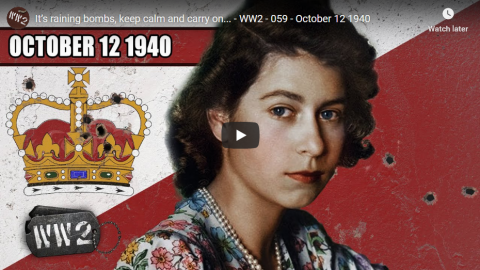Extra Credits
Published 12 Oct 2019Join us on Patreon! http://bit.ly/EHPatreon
Let’s lay down the foundations for one of the architectural marvels of the ancient world: At its height, the city of Angkor was, by several measures, the largest city of the medieval era. With a million people and a footprint larger than modern-day New York, it was arguably the world’s largest pre-industrial city. And at its center lay the magnificent Angkor Wat.
October 13, 2019
Building Angkor – Monsoon Metropolis – Extra History – #1
Sesame Street finally gets real
I think we can all agree that the problem with children’s TV is that it’s not gritty and realistic enough for the children of today. Well, the situation is being addressed by those brave folks who produce Sesame Street:
Sesame Street has introduced Karli, a puppet whose mother is addicted to opioids. I applaud them. For too long, children’s shows have been bright, happy, colourful and filled with problems that can be easily resolved. It’s time we saw the alleys and overflowing gutters behind the buildings of Sesame Street — the suicides, prostitution and addictions that run rampant after the sun sets. It’s time children learned about real life. It’s time children learned about flesh-eating diseases, absent fathers, and the unforgiving cycle of life. That their heroes are frauds and everyone dies, including their favourite pets and all their hopes and dreams.
It’s time children learn why people are drawn to heroin in the first place. That life can be so crushing and hopeless that the only other answer is death. It is time children learn that although on the outside the heroin addict may look sick, miserable, terrifying and disgusting, inside they feel better than you will ever know. That the feeling is so good inside, the addict forgets about the vessel and the outer part of the body slowly begins to slip away. From the outside it is hard to watch a heroin addict slowly deteriorate, and even harder to imagine how someone could let themselves fall into that state. But inside they feel perfect. Religion, spirituality, and gurus have often spoken of finding inner peace and joy, and there is no peace within as perfect as the high of heroin.
It is a feeling so good it makes parents neglect their children, as in Karli’s case. A feeling so good the user forgets everything — everything bad, and everything good. It is better than the feeling of accomplishing goals, of success or love. It is perfect — that is until it fades away. So, you chase that perfect feeling for the rest of your life, getting close, but never quite attaining it again. You chase forward, day after day, as everything around you slowly slips away, your youth, your family, your hopes and your dreams.
It’s raining bombs, keep calm and carry on… – WW2 – 059 – October 12 1940
World War Two
Published 12 Oct 2019The Blitz continues while Chinese Communists are fighting Chinese Nationalist in China. But the mass bombing of civilian targets does not really do what it is supposed to.
Join us on Patreon: https://www.patreon.com/TimeGhostHistory
Or join The TimeGhost Army directly at: https://timeghost.tvFollow WW2 day by day on Instagram @World_war_two_realtime https://www.instagram.com/world_war_two_realtime/
Join our Discord Server: https://discord.gg/D6D2aYN.
Between 2 Wars: https://www.youtube.com/playlist?list…
Source list: http://bit.ly/WW2sourcesWritten and Hosted by: Indy Neidell
Produced and Directed by: Spartacus Olsson and Astrid Deinhard
Executive Producers: Bodo Rittenauer, Astrid Deinhard, Indy Neidell, Spartacus Olsson
Creative Producer: Joram Appel
Post-Production Director: Wieke Kapteijns
Research by: Indy Neidell
Edited by: Iryna Dulka
Map animations: Eastory
Sound design: Marek KaminskiColorisations by Norman Stewart and Julius Jääskeläinen https://www.facebook.com/JJcolorization/
Eastory’s channel: https://www.youtube.com/channel/UCEly…
Archive by Screenocean/Reuters https://www.screenocean.com.A TimeGhost chronological documentary produced by OnLion Entertainment GmbH.
From the comments:
World War Two
2 days ago
Indy mentioned our Instagram page, where we make a daily post about what happened in the war on that day. This might be something completely different from what’s covered in these videos, or might add some more details. You can follow it by searching @world_war_two_realtime or by clicking here: https://www.instagram.com/world_war_two_realtime/. See you there!
Cheers,
Joram
Modern journalism encompasses “activism,” “advocacy,” “partisanship,” “satire,” “hoaxing,” “unbearable self-promotional bluster,” “pranks,” “torquing of facts,” “invective,” “demagoguery” and “stunts”
I’ve always been pretty cynical about the media, so it was no surprise to me when the federal government decided to start explicitly subsidising the rest of the media (they already fund the CBC), and part of the fun was deciding who qualifies for those juicy subsidies. I mean, “journalism” today is a pretty broad category that covers a lot more than the traditional TV, radio, magazine, and newspaper formats. I’m sure everyone is shocked — Shocked! — to discover that the government is playing favourites among the many media outlets over not just who gets subsidies, but even who gets accredited to cover political events.

Jack Layton, leader of the federal New Democratic Party of Canada, on January 2, 2006 in a media scrum outside a campaign rally at the Kent Street legion in Ottawa, Canada.
Photo by Thorfinn Stainforth via Wikimedia Commons.
As we’re in the late stages of a federal election campaign, the question of who is considered to be a “journalist” merits closer attention, as Colby Cosh explains:
Two media outlets of a right-wing character, Rebel Media and the True North Centre for Public Policy, have been denied accreditation for post-debate press appearances at the last minute. The Parliamentary Press Gallery, acting on behalf of the federal Leaders’ Debates Commission, has somehow decided that their delegates are advocates rather than journalists. Oh-ho.
Here, an agent of the state seems to have pushed the “So who’s a journalist?” question really to the forefront, and introduced a distinction between journalism and activism that may not be tenable. The history and practice of journalism, even at the highest levels of public and professional esteem, includes entities and activities that fall into all of the following categories: “activism,” “advocacy,” “partisanship,” “satire,” “hoaxing,” “unbearable self-promotional bluster,” “pranks,” “torquing of facts,” “invective,” “demagoguery” and “stunts.”
If we must march toward state licensing of journalism in double-quick time, and this seems to be happening whether I like it or not, arguments about the definition of journalism will have to recognize these realities. But, of course, the word “journalism” as used from day to day is mostly just a status marker (really, a label concocted for academic use). “Journalism” will resist any historically aware attempt to bound it with a list of scientific-type taxonomic criteria.
This, of course, does not rule out an ignorant or fanciful attempt to set criteria. But most of the concepts in the list I made above, a list of things some people would like to exclude from journalism, are themselves ideas founded on fuzzy judgments of value, or of mere taste.
The media outlaws who found the debate gates shut in their faces got together and sought an injunction requiring the commission to allow them to appear in the magic chamber of questions after the debate. No one had really explained the decision to exclude them; no one could point to a solid pre-existing definition of journalism that they did not meet (surprise!), or to a relevant formal policy of the commission. It really gets the attention of a judge when the state behaves in an arbitrary way, and this proved to be the case, foreseeably, at the oral hearing for the injunction. Which was granted.
But an injunction is a temporary emergency remedy that does not require a full hearing of the facts — only the possibility of immediate incorrigible harm. The question haunting the Dominion — the question of who is a journalist — remains athwart our path.
Tank Chats #52 Sherman Crab Flail | The Funnies | The Tank Museum
The Tank Museum
Published on 15 Jun 2018Tank Chats playlist https://www.youtube.com/playlist?list…
Another episode in the Tank Chats Funnies Specials, looking at the weird and wonderful vehicles of 79th Armoured Division led by Major General Percy Hobart.
The Flail tank was designed to clear mines and flails were operated in the 79th Armoured Division after D-Day.
Support the work of The Tank Museum on Patreon: ► https://www.patreon.com/tankmuseum
Or donate http://tankmuseum.org/support-us/donateVisit The Tank Museum SHOP: ►https://tankmuseumshop.org/
Press the little bell above to enable NOTIFICATIONS so you don’t miss the latest Tank Museum videos.
Twitter: ► https://twitter.com/TankMuseum
Tiger Tank Blog: ► http://blog.tiger-tank.com/
Tank 100 First World War Centenary Blog: ► http://tank100.com/ #tankmuseum #tanks #tankchats
QotD: The modern British army is custom-tailored to resist reform of any meaningful type
This then leaves the army in a bit of a quandary. It has focused on delivery of a global division as its benchmark at a time when the politicians simply do not want to do this. It has focused on keeping 82,000 troops when it can’t afford to keep them all equipped, and to meet the political priority of protecting certain regimental capbadges, it has been forced to sacrifice its far more valuable logistics, communications and other enablers that keep it as a genuinely effective force.
Talking to friends in the army, there is a real sense of anger and frustration among many mid-level officers. The veterans of [Operation] HERRICK feel that the army hasn’t learned lessons and remains bound by tradition and an inability to really learn. Candidly, many feel that the UK “lost” in Afghanistan and hasn’t yet accepted this fact. They feel the army is overly top heavy and rigid and unable to really adapt to 21st century warfare. Suggestions that much of the army exists as a structure to support rapid expansion in the future is met with a hollow snort of derision – we could never do a WW1-style rapid expansion again for the legacy reserve stocks of weapons and equipment have long since been disposed of as part of the move to RAB accounting in the early 2000s.
The operations that the army is likely to be involved in are either low level defence engagement, or as part of NATO reassurance in Eastern Europe. The chances of needing BAOR established again are slim – if we get to the stage where the UK is trading shots with the Russians, then things will be quickly escalating beyond the point where conventional weapons are of value. Home defence remains an issue, although the days of Exercise “Brave Defender” will never be repeated — the threat is completely different. There is simply no credible home threat that needs the army to deploy against invasion or insurrection. It is telling that there has been a move to get back into the Aid to the Civil Power role again, if only because having troops able to do flood relief helps generate positive headlines.
Whenever brave efforts are made to try and look again at how things can be done differently to free up funding (such as closing RHQs or making sense of the archaic HQ and regimental structure) leaks to the press ensure a media and Parliamentary furore that prevents real change being put into play. This stops the army from being able to genuinely restructure itself because the moment it tries to do so, some tired old headline such as “we don’t have an army anymore, only a militia” (an utter fallacy) appears and men of a certain generation with angry moustaches and blazers with badges and purchased medals write to their MPs. In a Parliament without a majority, it only takes a minor backbench rebellion to threaten chaos, meaning no minister will risk reform if it angers the backbenches.
The army today faces a structural and existential crisis. Too large to be properly funded, and politically barred from restructuring itself (although the recent 2017 manifesto pledge is merely to preserve the headline strength of the forces, not the individual services, so there is still hope). Denied a credible enemy that it can prepare to fight against, it has no clear rationale for why it needs to operate at a large scale when the political decision makers are increasingly set against boots on the ground for long term commitment.
Sir Humphrey, “How Do You Solve a Problem Like a Deployable Division?”, Thin Pinstriped Line, 2017-08-06.







